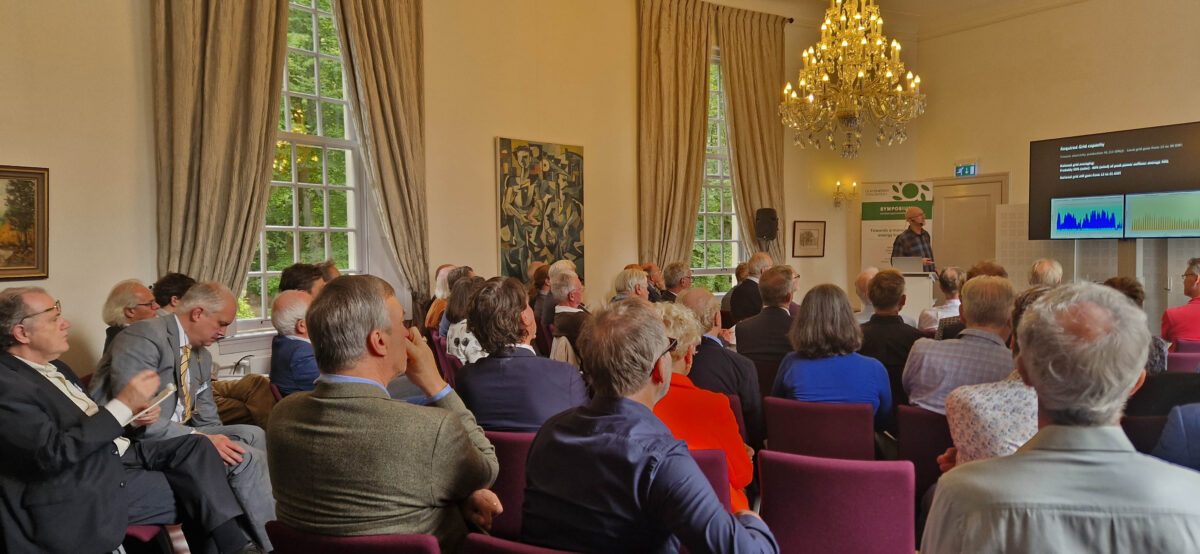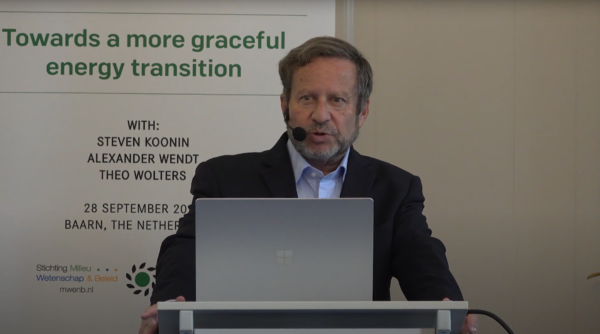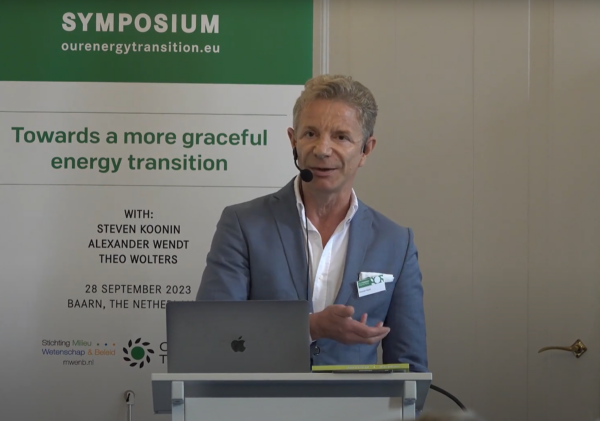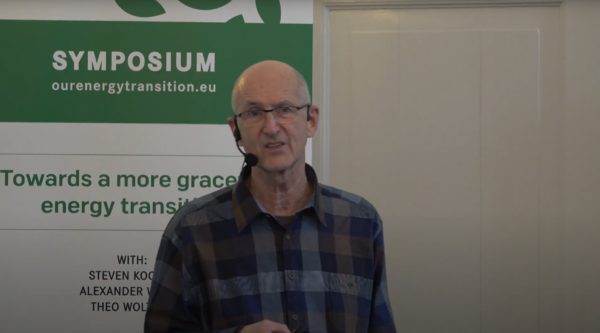Symposium “Towards a more graceful energy transition”, with Prof. Steven Koonin
Kasteel Groeneveld, Baarn; 28 september 2023, 9.00u
Op 28 september organiseerde Stichting Milieu, Wetenschap en Beleid een symposium over een andere, elegantere aanpak van de energietransitie.
(Zie hier voor de symposium website)
Aanleiding was het bezoek aan Nederland van Steven Koonin, voormalig staatssecretaris wetenschap en klimaat van president Obama.
Hij was hier voor de publicatie van de Nederlandse vertaling van zijn bestseller “Unsettled” (“Onbeslist”). Daarvan nam hij de avond tevoren het eerste exemplaar in ontvangst in een grote bijeenkomst in Antropia, uit de handen van Marcel Crok, mede-oprichter van Clintel.
Zijn presentatie over de stand van de klimaatwetenschap en de kern van zijn boek (er is te weinig wetenschappelijke onderbouwing voor een zeer ingrijpend en overhaast klimaatbeleid) vindt u hier.
Op het symposium spreekt hij over de overhaaste, ondoordachte en onhaalbare aanpak van de energietransitie in de Westerse landen en pleit hij voor een meer weloverwogen en effectieve aanpak.
Voorafgaand aan Koonin sprak Theo Wolters (voorzitter van de organiserende stichting) over een ander energiesysteem als voorwaarde voor een efficiente overgang naar fossielvrije bronnen, en Alexander Wendt over de ernstige gevolgen van het klimaatbeleid in Duitsland.
Groeneveld Castle, Baarn; September 28, 2023, 9:00 am
On September 28, the Environment, Science and Policy Foundation organized a symposium on a different, more graceful approach of the energy transition.
(See this link for the symposium website)
The reason was the visit to the Netherlands of Steven Koonin, former State Secretary for Science and Climate of President Obama.
He was here for the publication of the Dutch translation of his bestseller “Unsettled”. The evening before, he received the first copy of it at a large meeting in Antropia, from Marcel Crok, co-founder of Clintel.
His presentation on the state of climate science and the core of his book (there is too little scientific basis for a very drastic and hasty climate policy) can be found here.
At the symposium he speaks about the hasty, ill-considered and unfeasible approach to the energy transition in Western countries and argues for a more well-considered and effective approach.
Prior to Koonin, Theo Wolters (chairman of the organizing foundation) spoke about a different energy system as a condition for an efficient transition to fossil-free sources, and Alexander Wendt about the consequences of climate policy in Germany.
Programma
9:30 Theo Wolters – A new design for our energy system, based on Solar, Wind, and Nuclear Energy
10:30 Alexander Wendt – Why the German Energiewende cannot work
11:30 Lunch
12:45 Prof Steven Koonin – Toward more graceful energy transitions
14:00 End
Hieronder vindt u de registratie van de drie presentaties
Theo Wolters: Towards a new energy system based on wind, solar and nuclear energy
(Chairman of The Environment, Science & Policy Foundation)
With the transition from fossil to CO2 free energy sources, comes a major shift in electricity price from fuel costs to investment costs, or in general, from operational expenses (OPEX) to capital expenses (CAPEX).
Far more important for the electricity price however is the difference in system costs between on-demand electricity production, and sun and wind driven production.
The present electricity system relies on a merit order based market, which has worked great for decades, but cannot cope with a substantial share of subsidised CAPEX driven production, in combination with a huge reduction of on-demand production. Without changing the system, we will end up with frequent and long black-outs, and a very high electricity price.
In my presentation I will compare solar and wind vs nuclear energy in an electricity system with a strongly reduced fossil fuel share on: production cost, backup cost, grid cost and net-stability cost (frequency-, inertia-, and reserve capacity).
I will propose a new electricity system, allocating the huge system costs to the sources that cause them. This which will restore market function, and deal with all demands of low carbon electricity production, thus providing both maximum grid stability and lowest electricity cost.
Alexander Wendt: Why the German Energiewende cannot work
(Distinguished journalist, and writer of the book The Green Blackout. Why The Energy Transition Cannot Work).
In his presentation, Alexander Wendt shows that some (unintended) negative consequences of the “Energiewende” (energy transition ) and “Atomausstieg” (the closing down of all nuclear power plants) are already occurring in Germany: both energy prices and CO2 emissions are the highest in Europe.
This has caused the investment balance to become extremely negative: German industry is investing abroad on a large scale, and a lot of companies are considering to leave Germany altogether. Last year there even was a net loss of €125 billion in equity, the largest net loss in the history of Germany, with over twelve times more equity flowing out of Germany than flowing in.
The opposite is happening with the electricity balance: before the “Atomausstieg” Germany was a net exporter of electricity. Now they have become a large net importer of (mainly nuclear!) energy from France.
Germany should focus more on designing an energy transition based on facts than on ideas and on excluding critics, and take into account the huge system costs of wind and solar.
Prof Steven Koonin – Toward more graceful energy transitions
(Director of the Center for Urban Science and Progress at New York University)
How can we move towards a reliable, affordable, sustainable energy system, while respecting the fundamentals of demographics, technology, economics, regulation, and behavior?
- Transitions are fundamentally slow and cannot be forced to speed up just like that.
- Solar and wind cause great problems by their intermittency and unreliability, we will need lots of (nuclear or hydrogen) power plants anyway.
- Net zero in 2050 world wide is a fantasy.
All energy experts know this already for decades, politicians privately agree, but publicly the story is kept alive.
But dismissing these facts leads to bad policies. We should be less political about the energy transition and and focus on looking at the facts while planning a realistic and more graceful transition!





